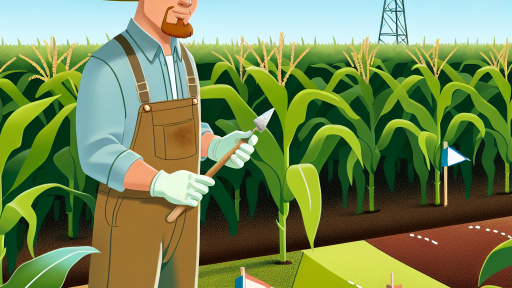Introduction to Ethical Farming and its Importance
Ethical farming prioritizes sustainability and social responsibility.
This approach benefits both the environment and communities involved.
Farmers use practices that promote animal welfare, environmental health, and economic fairness.
Consequently, ethical farming contributes to a more sustainable food system.
Benefits of Ethical Farming
One major benefit is reduced environmental impact.
Ethical farming practices often lead to healthier soils and ecosystems.
Moreover, they help to conserve natural resources, such as water and biodiversity.
Additionally, ethical farming supports local economies through fair trade.
Animal Welfare Considerations
Ethical farming emphasizes the humane treatment of animals.
Farmers provide animals with adequate space, opportunities for natural behaviors, and proper care.
This not only improves animal health but also enhances the quality of farm products.
Community Impact
Ethical farming fosters community relationships and promotes social justice.
Farmers often engage with local communities and support local economies.
This engagement allows for collaboration in addressing community needs and resource sharing.
In this way, ethical farming strengthens social ties and builds resilient communities.
Transform Your Agribusiness
Unlock your farm's potential with expert advice tailored to your needs. Get actionable steps that drive real results.
Get StartedImplications of Ethical Farming Practices
Ultimately, ethical farming practices address critical environmental and social issues.
By choosing ethical options, consumers contribute to a healthier planet.
This collective effort leads to a more sustainable and equitable agricultural system.
Overview of Ethical Farming Certifications
Defining Ethical Farming Certifications
Ethical farming certifications signify adherence to sustainable and humane practices.
These certifications ensure farmers meet specific environmental and social standards.
They aim to promote transparency in food production processes.
Importance of Ethical Farming Certifications
Certificates enhance consumer trust in agricultural products.
They help consumers make informed choices regarding their food sources.
Moreover, they encourage farmers to adopt better practices.
Key Types of Ethical Farming Certifications
Various certifications exist to guide ethical farming practices.
- USDA Organic: Focuses on natural farming without synthetic chemicals.
- Fair Trade: Ensures fair wages and better working conditions for farmers.
- Animal Welfare Approved: Prioritizes the humane treatment of livestock.
Each certification addresses different aspects of agricultural ethics.
Certification Processes
Obtaining a certification involves rigorous evaluation and application processes.
Farmers must adhere to defined standards to qualify.
Compliance checks are essential for maintaining certification status.
Benefits of Certification for Farmers
Certifications can improve market access for farmers.
They often lead to premium pricing for certified products.
Additionally, certifications can enhance a farm’s sustainability practices.
Challenges in Certification
Farmers face various challenges during the certification process.
Costs associated with obtaining and maintaining certifications can be high.
Moreover, navigating complex guidelines can be daunting.
Consumer Impact
Ethical farming certifications empower consumers to support responsible farming.
They influence purchasing decisions and encourage ethical consumption.
Ultimately, these certifications contribute to a more sustainable food system.
Key Differences Between Organic and Ethical Certifications
Understanding Organic Certifications
Organic certifications focus on the methods of production.
Showcase Your Farming Business
Publish your professional farming services profile on our blog for a one-time fee of $200 and reach a dedicated audience of farmers and agribusiness owners.
Publish Your ProfileThey require farmers to adhere to regulations that avoid synthetic chemicals.
Organic farming promotes biodiversity and soil health.
Additionally, it ensures livestock are raised in a natural environment.
Certification often involves a third-party evaluation to ensure compliance.
Exploring Ethical Certifications
Ethical certifications prioritize animal welfare and fair trade practices.
They ensure farmers treat their livestock humanely.
Furthermore, these certifications aim to support local communities economically.
Transparency in supply chains is crucial for ethical certifications.
Organizations often evaluate farming practices and labor conditions.
Key Differentiators
Organic certifications focus on production techniques and inputs.
In contrast, ethical certifications emphasize the social and economic impacts.
Organic does not always guarantee ethical labor practices.
However, ethical certifications encompass aspects of organic farming.
Benefits of Both Certifications
Consumers gain reassurance about health and environmental impacts.
Both certifications inspire sustainability in agricultural practices.
They raise awareness about the importance of responsible farming.
Moreover, these labels can increase market demand for products.
Discover More: Advantages Of Ethical Livestock Farming
Prominent Ethical Farming Certifications Explained
Introduction to Ethical Certifications
Ethical farming certifications guide consumers in making responsible choices.
They ensure that farming practices meet high standards of sustainability.
These certifications often require a rigorous verification process.
Organic Certification
Organic certification signifies that the farming practices are chemical-free.
Farmers must adhere to strict guidelines set by organizations like the USDA.
This certification covers crop production, livestock raising, and food processing.
Moreover, it promotes biodiversity and soil health.
Fair Trade Certification
Fair Trade certification focuses on equitable trade practices.
This certification ensures that farmers receive fair compensation for their products.
It also promotes sustainable farming and helps communities thrive.
Consumers can identify Fair Trade products by looking for specific labels.
Animal Welfare Certifications
Animal welfare certifications emphasize humane treatment of livestock.
Organizations like Certified Humane set standards for animal care.
These standards include adequate living conditions and humane handling practices.
Consumers can trust that certified products come from responsible farms.
Regenerative Agriculture Certification
Regenerative agriculture certification promotes practices that restore ecosystems.
This certification focuses on improving soil health and increasing biodiversity.
Farmers adopting regenerative methods work towards carbon sequestration.
Additionally, this approach benefits both the land and local communities.
Understanding Ethical Certifications
Understanding ethical farming certifications empowers informed consumer choices.
By choosing certified products, consumers support responsible farming practices.
Ultimately, this contributes to a more sustainable future for agriculture.
Showcase Your Farming Business
Publish your professional farming services profile on our blog for a one-time fee of $200 and reach a dedicated audience of farmers and agribusiness owners.
Publish Your ProfileFind Out More: Raising Animals Ethically On Farms
The Certification Process
Initial Preparation
Farmers begin the certification process by researching applicable standards.
Knowledge of required practices and documentation is crucial at this stage.
It helps to connect with other certified farmers for insights and tips.
Application Submission
Once prepared, farmers submit their application to the certifying body.
This application typically includes detailed records of farming practices.
Additionally, farmers must provide documentation regarding inputs and resources.
Site Inspection
After reviewing the application, a site inspection is scheduled.
During the inspection, a certified inspector evaluates farming practices.
The inspector checks for compliance with the relevant standards.
Report and Review
Post-inspection, the inspector compiles a report on findings.
The certifying body reviews this report in detail.
They assess if the farmer meets all necessary requirements for certification.
Certification Decision
Based on the review, a decision is made whether to grant certification.
If approved, farmers receive their certification, completing the process.
If denied, the certifying body provides feedback for improvement.
Maintaining Certification
After obtaining certification, ongoing compliance is essential.
Farmers must periodically renew their certification through reevaluation.
Staying informed about changing standards will also help maintain certification.
Uncover the Details: CSA Farming Best Practices for Modern Farmers

Benefits of Ethical Farming Certifications for Consumers
Enhanced Food Safety
Ethical farming certifications promote safer food practices.
They often require rigorous safety inspections and standards.
This process ensures that consumers receive healthier products.
Additionally, certified farms minimize the use of harmful chemicals.
Improved Quality of Food
Consumers enjoy better quality food from certified farms.
These products are often fresher and more flavorful.
Moreover, ethical farming practices enhance nutritional value.
Overall, customers can taste the difference in certified products.
Support for Local Economies
Purchasing from certified farms benefits local economies.
Local farmers gain access to markets and consumers.
This fosters community growth and sustainability.
Furthermore, ethical practices ensure fair wages for workers.
Environmental Impact
Ethical farming certifications promote practices that protect the environment.
These methods reduce soil degradation and conserve water.
In addition, they help maintain local biodiversity.
Consumers contribute to environmental preservation by choosing certified products.
Transparency and Trust
Certifications provide consumers with greater transparency.
They can easily find information about farming practices.
This transparency fosters trust between consumers and producers.
Ultimately, it empowers consumers to make informed decisions.
Showcase Your Farming Business
Publish your professional farming services profile on our blog for a one-time fee of $200 and reach a dedicated audience of farmers and agribusiness owners.
Publish Your ProfileGain More Insights: Sustainable Farming Equipment And Innovations
Challenges Farmers Face in Obtaining Certifications
Complexity of Certification Standards
Navigating certification standards can overwhelm farmers.
Each certification comes with unique requirements to fulfill.
Understanding these complex standards often demands significant time and effort.
Consequently, farmers may struggle to meet all criteria effectively.
Financial Burden
Certification processes often involve substantial costs.
Farmers must invest in training, documentation, and audits.
This financial burden can be particularly challenging for small farms.
For instance, many farmers report a need for additional funding sources.
Time Consumption
Obtaining certifications can be a lengthy process.
Farmers often find themselves juggling multiple responsibilities.
This includes managing crops and livestock alongside certification tasks.
Consequently, farmers may face time constraints that hinder their efforts.
Access to Resources and Support
Not all farmers have equal access to necessary resources.
Many lack guidance from agricultural experts or organizations.
This can hinder their ability to understand and complete certification processes.
In addition, language barriers may further complicate access to support.
Market Demand and Fluctuations
Market demand can fluctuate, affecting farmers’ certification decisions.
Some may hesitate to pursue certifications if profit margins are unclear.
This uncertainty can lead to difficult choices regarding long-term investments.
Consequently, some farmers may prioritize immediate financial needs over certifications.
Future Trends in Ethical Farming and Certification Standards
Technological Integration
Technology increasingly plays a vital role in ethical farming.
Farmers now use apps for tracking sustainability metrics.
For instance, data analytics help optimize resource use.
Moreover, drones assist in monitoring crop health remotely.
This integration enhances efficiency and reduces waste.
Consumer Awareness and Demand
Shifting consumer preferences drive the demand for ethical farms.
More buyers seek products that align with their values.
Consequently, certified products often command higher prices.
In response, farmers emphasize transparency in their practices.
Educating consumers about certifications can also boost demand.
Enhanced Certification Bodies
Increased scrutiny leads to higher standards among certification bodies.
Organizations are striving for greater credibility and integrity.
For example, new certifications are emerging globally.
Each seeks to address unique regional challenges and resources.
As a result, farmers may find more opportunities to certify their practices.
Collaboration and Partnerships
Collaboration among stakeholders is essential within the industry.
Farmers, retailers, and certification bodies are forming strategic partnerships.
These alliances facilitate knowledge sharing and best practices.
Additionally, partnerships can lead to joint marketing initiatives.
Showcase Your Farming Business
Publish your professional farming services profile on our blog for a one-time fee of $200 and reach a dedicated audience of farmers and agribusiness owners.
Publish Your ProfileSuch efforts enhance visibility for ethical farming practices.
Focus on Climate Resilience
The changing climate influences certification standards significantly.
Farmers must adopt practices that increase climate resilience.
Therefore, certifications are adapting to include climate change factors.
Such standards promote sustainable water use and soil management.
This shift ensures farms can thrive in a changing environment.
Ongoing Education and Training
Continuous education for farmers regarding certification is crucial.
Workshops and courses can significantly enhance their skills.
Furthermore, educational programs focus on sustainable techniques.
Such training empowers farmers to maintain compliance and improve practices.
In turn, this commitment benefits both the environment and the community.
Additional Resources
Third-Party Audit Finds Foster Farms Continues Commitment to …
What the Fetish for Orange Egg Yolks Tells Us About Ourselves – Eater




